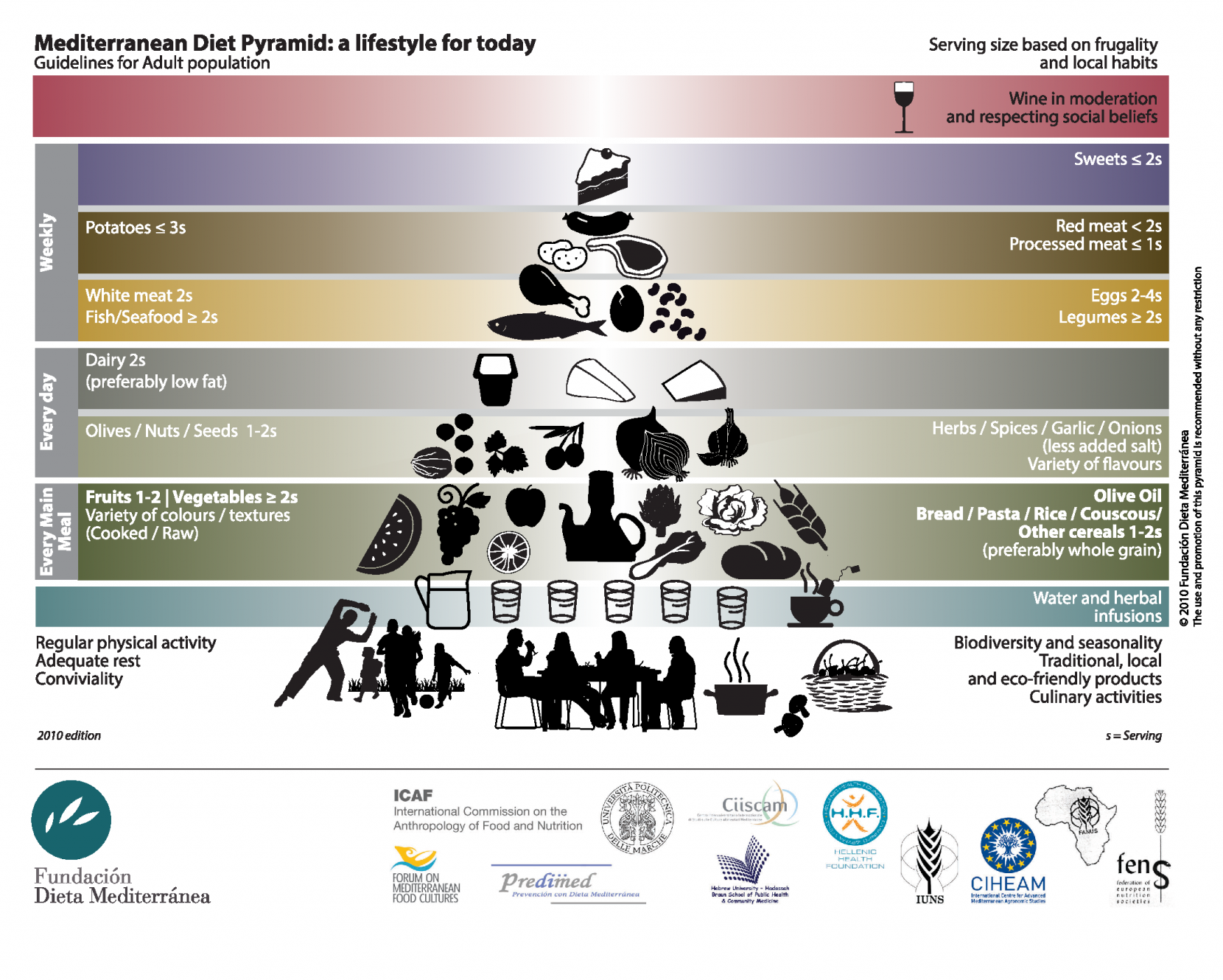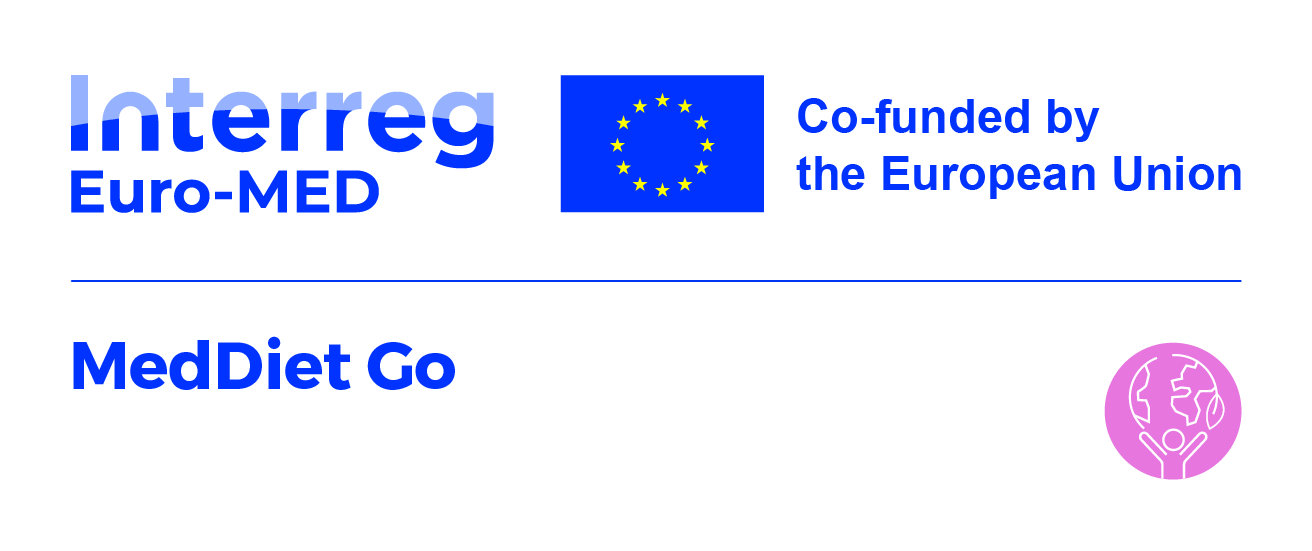The Mediterranean Diet throughout History
Cyprus, Croatia, Spain, Greece, Italy, Morocco and Portugal inscribed the Mediterranean Diet in 2013 on the Representative List of the Intangible Cultural Heritage of Humanity. Definition of the Mediterranean Diet by UNESCO: “The Mediterranean diet involves a set of skills, knowledge, rituals, symbols and traditions concerning crops, harvesting, fishing, animal husbandry, conservation, processing, cooking, and particularly the sharing and consumption of food. Eating together is the foundation of the cultural identity and continuity of communities throughout the Mediterranean basin. It is a moment of social exchange and communication, an affirmation and renewal of family, group or community identity. The Mediterranean diet emphasizes values of hospitality, neighbourliness, intercultural dialogue and creativity, and a way of life guided by respect for diversity. It plays a vital role in cultural spaces, festivals and celebrations, bringing together people of all ages, conditions and social classes. It includes the craftsmanship and production of traditional receptacles for the transport, preservation and consumption of food, including ceramic plates and glasses. Women play an important role in transmitting knowledge of the Mediterranean diet: they safeguard its techniques, respect seasonal rhythms and festive events, and transmit the values of the element to new generations. Markets also play a key role as spaces for cultivating and transmitting the Mediterranean diet during the daily practice of exchange, agreement and mutual respect.”
Mediterranean Diet has its origin in adjacent regions to the Mediterranean Sea basin, a place with distinctive environmental characteristics and played a relevant role in humanity history. Some historians call this geographical area “the cradle of society” due to its relevance during ancient world development. Mediterranean regions were a meeting place that enabled several cultures to interact. Civilizations exchanged customs, lifestyles, languages and beliefs, which were changing and transforming over the time, from Cretans, Phoenicians, Greeks to Romans.
Agriculture had a key role, being cereals and vegetables the most available foods. Whereas animal foods were less frequents than fish and seafood, especially in the recipes from richer population. Bread, wine, olives and olive oil were the most habitual foods. Mediterranean Diet has been continuously evolving; different people influenced and contributed with novel foods that enriched this dietary pattern.
Mediterranean Diet has been also influenced by German people, who were mainly nomads, hunters and farmers. Arab people also contributed with some key foods such as spices, which are highly appreciated, and plant-based vegetables such as aubergines, almonds, oranges, lemons and pomegranates. In addition, the discovery of America represented an important ephemerid that brought a wide range of unknown foods (e.g. potatoes, tomatoes, peppers, corn and new varieties of beans. Those foods are now part of the foundations of the Mediterranean Diet.
Currently, traditional Mediterranean Diet is usually described such as diet in Crete, Greece and regions in the south of Italy at the beginning of the 1960s. However, Spanish, Italian, Moroccan, French, Lebanese, Turkish, Portuguese and other Mediterranean countries diets have similarities in their composition. In addition, this food pattern is accompanied by regular physical activity. In 2013, United Nations Educational, Scientific and Cultural Organization (UNESCO) recognized the Mediterranean Diet as a part of Human Culture and Intangible Cultural Heritage.
Mediterranean Diet goes beyond to be only an exceptional dietary pattern; it also involved life-style, a Mediterranean dynamic cultural complex, which include traditions concerning to agriculture, fishing and livestock, food processing, preservation, cooking techniques, food sharing and consumption. Cooking and meals are perfect social meetings to exchange ideas and communicate with family, friends and neighbours, to forge closer ties, in cordiality and respect. The Mediterranean Diet has a main role in culture, being present in festivities, celebrations and daily life, represented in crafts, in markets, as places for exchange, or inside familiar nucleus, where techniques and recipes are transmitted.
Dietary intake and food pattern plays a relevant role in human health. However, the link between the Mediterranean Diet and health was not described until 1960, after that some scientific results were available. The American physiologist Ancel Keys and his colleagues published the Seven Countries study, an observational study that showed the relationship between the Mediterranean dietary pattern and its protective effect against coronary heart disease and cardiovascular mortality. This study linked for the first time saturated fat acids intake and high fasting total cholesterol blood levels with coronary heart disease mortality in different populations. Similar results were subsequently observed by the MONICA (Multinational Monitoring of Trends and Determinants in Cardiovascular Disease) program which collected data about total mortality and mortality from heart disease in 26 countries between 1950 and 1978. Data permitted to observe a north-south gradient, so that North countries had a higher cardiovascular disease-related mortality than South countries. Moreover, it has been noted that the Mediterranean Diet is present in certain regions so-called Blue Zones (Sardinia in Italy and Icaria in Greece), which are distinguished by their life expectancy and quality of life.
Over the last several decades, scientific evidence has related Mediterranean Diet adherence with health benefits in blood lipids concentration, blood pressure, insulin resistance, arterial stiffness, oxidative stress, lower cardiovascular risk and a better evolution of diabetes and cardiovascular diseases. This has contributed to its recognition such as a healthy diet by several international organisations. Since 2010, American Dietary Guidelines included Mediterranean eating pattern style as an example of a healthy diet, but also the traditional Mediterranean Diet has been introduced in gastronomy because of its ingredients and tasty key foods.
Mediterranean Diet Pyramid

At present, there are many sources of information that provide advice on nutrition and how the population should be fed, and sometimes, this creates confusion, because each country has different cultures, and this is difficult to adapt. That is why dietary guidelines are an important part of promoting the consumption of adequate food within each sector of the world’s population.
International organisations such as the Food and Agriculture Organization (FAO) offer global perspectives on nutrition and sustainable food systems that contribute to the development of these guidelines. Visit the FAO website for more information.
The food guides are the educational tool that the health administrations make available to the general healthy population in order to adapt in an easy and understandable way the scientific knowledge about the nutritional requirements and food composition. They are shown graphically and are easy to understand. Almost all countries have a guide, designed according to the policies that govern it. It is considered a very useful tool to educate and guide the population towards a healthier diet. They are extremely important because they influence the promotion of health and thus prevent diseases that are increasing today. They are also adapted in relation to the culture, customs, and availability of food for each of them.
Scientific Evidence
The Mediterranean Diet is a lifestyle with a dietary pattern that has been built from thousands of interactions amongst the different societies and cultures that have lived in the Mediterranean Basin. This eating habit is characterised by seasonal food produced locally and minimally processed rich in high-quality nutrients and bioactive compounds. The Mediterranean Diet promotes a high amount of fruits, vegetables, legumes, and whole-grain cereals, as well as nuts and seeds. Moreover, olive oil is of the central elements and is used in each daily meal. Furthermore, the Mediterranean Diet also includes a moderate amount of dairy products, eggs, fish, and seafood; meat and processed food are recommended in a lower amount. One of the main features of this eating habit it’s its richness in the use of different spice types for cooking, as well as a moderate amount of wine consumption during the meals.
The World Health Organization (WHO) has also recognised the Mediterranean Diet for its numerous health benefits and has compiled resources and research supporting its promotion. Learn more on the WHO website.
It is since the Seven Countries Study (SCS) – https://www.sevencountriesstudy.com, led by Ancel Keys and his Italian colleague Flaminio Fidanza, as well as their SCS colleagues, in the ‘60s, they showed together with their colleagues that dietary patterns in the Mediterranean and Japan at that time were associated with low rates of coronary heart disease and all-cause mortality. This was the first major study that investigated diet and lifestyle along with other risk factors for cardiovascular disease by contrasting countries (USA, Finland, Yugoslavia, Netherlands, Italy, Greece, and Japan) and their cultures over an extended period of time 1958 – 1983 (25 years).
More recently, in 2013, the PREDIMED study – http://www.predimed.es/, led by Dr. Ramón Estruch, with a total of 7447 participants (55 to 80 years of age, 57% women), concluded that among people with high cardiovascular risk, a Mediterranean diet supplemented with extra virgin olive oil or nuts reduces the incidence of serious cardiovascular events.
If you’re interested in knowing your adherence to the Mediterranean Diet pattern, take up this 14 short questions test based on the PREDIMED test used during the study.
Health Benefits
There is scientific evidence that a traditional Mediterranean diet consisting of large amounts of fresh and seasonal fruits and vegetables, nuts, fish, dairy products, virgin olive oil, and a moderate amount of red wine – coupled with physical activity – can reduce the risk of serious mental and physical health problems by:
Increasing your life expectancy and reducing mortality rates
Several studies have evaluated the effects of high adherence to the traditional Mediterranean diet on life expectancy and, consequently, to all-cause mortality and mortality due to specific causes. For example, the second phase of the Seven Country Study already observed significantly lower mortality due to cardiovascular disease in Greece compared to the mortality observed in the USA or Finland in the ‘60s.
Reducing obesity and overweight and helping to maintain a healthy weight
Obesity is a key risk factor for morbidity and mortality from cardiovascular disease and the development of type 2 diabetes, some types of cancers, and other disorders.
The standard recommendation for the prevention and treatment of obesity/ overweight is restricting (or reducing drastically) dietary energy intake and increasing physical activity. Fat in food is high in kcal (energy) and there is a persistent belief that increased dietary fat intake will lead to weight gain, whereas reduced fat intake will promote weight loss. The intake of both olive oil and nuts, as part of the Mediterranean Diet, are categorised as healthy fats because they have been associated with the prevention of cardiovascular disease and weight loss compared to processed fats.
Preventing cardiovascular diseases
Cardiovascular disease continues to be the main cause of death worldwide. The PREDIMED study concluded that a Mediterranean Diet supplemented with either extra-virgin olive oil or nuts was associated with a 30% relative reduction in major cardiovascular events, i.e. the risk to suffer from health problems was 30% lower in the people that intake those foods compared to the ones who didn’t.
Preventing and controlling type 2 diabetes
Mediterranean diets are rich in fruit, vegetables, and whole grains and are widely known to be healthy for people with type 2 diabetes. Many studies have proven its protective effect over this disease because it can help diabetics control their blood sugar levels more efficiently, especially for its high amount of natural fiber.
Preventing certain types of cancer
Higher adherence to the Mediterranean Diet has been associated with lower cancer mortality, especially for colorectal cancer.
Reducing mental health problems
Data increasingly has shown that some dietary patterns are connected with reduced prevalence and reduced risk of psychiatric illness, mainly anxiety and depression, but also including bipolar disorders, Alzheimer and Parkinson’s disease. Studies carried out in recent years also indicate that dietary interventions in patients with depression may constitute an effective and accessible treatment strategy against this disease. Thus, a healthy diet such as the Mediterranean diet may help to prevent and even to improve psychiatric disorders.
Promoting healthy and sustainable dietary patterns, such as the Mediterranean Diet, also aligns with the United Nations Sustainable Development Goals (SDGs), particularly those related to health, food security, and well-being. Explore the SDGs here.
The Mediterranean Diet has been recognized as one of the most healthy diets in the world by WHO
The Mediterranean Diet has been recognized as one of the most sustainable diets in the world by FAO
The Mediterranean Diet has been recognized as part of the Representative List of the Intangible Cultural Heritage of Humanity









